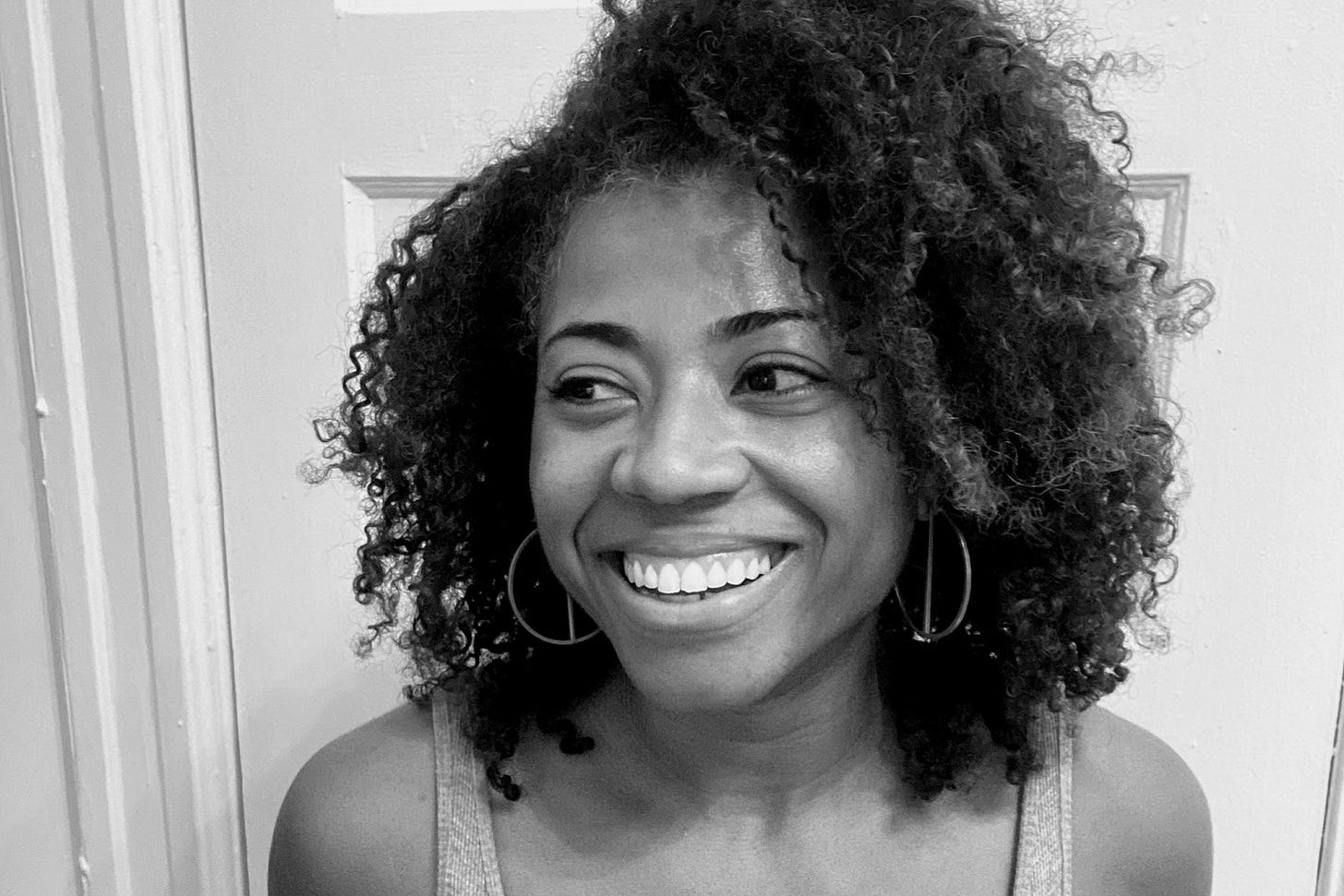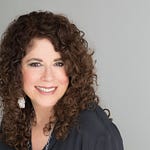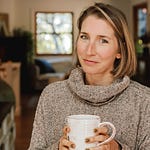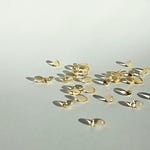The first part of this episode is available to all listeners. To hear the whole thing, become a paid subscriber here.
Registered dietitian and author Shana Minei Spence joins us to discuss how a career in fashion affected her relationship with food and her body, her experience with a holistic provider who recommended elimination diets, how values and social norms influenced her use of alternative medicine, her disordered motivations for becoming a dietitian, and more. Behind the paywall, we get into how she recovered from her eating disorder, why she takes an anti-diet approach to nutrition, her experience working in the public-health field, cultural appropriation in wellness, and where she stands on wellness culture and alternative medicine now.
Shana is a Registered Dietitian Nutritionist based in Brooklyn, New York. She currently works in public health for the Department of Health and Mental Hygiene, doing community nutrition lessons, and also owns her own company, The Nutrition Tea®. She describes herself as an "all foods fit" dietitian. and creates a platform for open discussion on nutrition and wellness topics that are inclusive, non-diet, and weight-neutral, all with an intersectionality of social justice. She also writes frequently for publications such as Self, Shape, Outside, and Well + Good Magazines. Her debut book came out in August 2024, titled Live Nourished: Make Peace with Food, Banish Body Shame, and Reclaim Joy (Bookshop affiliate link). Speaking engagements include Peloton, NEDA, Eating Recovery Center, The Rose Retreats, Food Fluence, Eat Well Global, and NBC. She can be seen in media such as NPR, Shape Magazine, GQ, SELF Magazine, Women's Health Magazine, Outside Magazine, ABC Good Morning America, and Healthline.
Resources and References
Contains affiliate links to Bookshop.org, where I earn a small commission for any purchases made.
Christy’s second book, The Wellness Trap: Break Free from Diet Culture, Disinformation, and Dubious Diagnoses and Find Your True Well-Being
Subscribe on Substack for extended interviews and more
Shana’s book, Live Nourished: Make Peace with Food, Banish Body Shame, and Reclaim Joy
Systematic review of systematic reviews: Use of Acupuncture for Adult Health Conditions, 2013 to 2021
Christy’s online course, Intuitive Eating Fundamentals
Transcript
Disclaimer: The below transcription is primarily rendered by AI, so errors may have occurred. The original audio file is available above.
Christy Harrison: Here is my conversation with Shana Minei Spence. So tell me about your relationship with food growing up.
Shana Minei Spence: So growing up as a kid, I actually had a pretty good relationship with food. My parents were both very much into the cooking and the social connection with food. So I have to say it wasn't really until college that it was affected. But growing up, I really loved kind of the social gatherings around food. I just remember my dad primarily being the actual cook of our household, which I know sounds sounds so funny, but my dad's from Jamaica, so he loved to cook, he loved to experiment with food, different recipes. So it was really great. Our house always smelled like something.
But it wasn't really until college, I would say that my relationship kind of shifted, and I think it was just the mindset of being in a different environment where I started to have all these other thoughts and that's sort of what changed. But growing up, I have to say, it was pretty good.
Christy Harrison: Yeah, that's rare and lovely to hear. I think it's far too uncommon in our world that people have a positive relationship with food growing up, although it's interesting how it kind of catches us no matter what, right?
Shana Minei Spence: Exactly.
Christy Harrison: I was the same. I grew up with a pretty positive relationship with food and luckily always had enough to eat and had also thin privilege that shielded me from being judged for my body size and told I needed to go on a diet or anything like that. So I just was basically able to be an intuitive eater. And then I went to college and it all kind of changed, being on my own and trying to take care of myself and being influenced by all these other people's ideas about food, I think was what really started to get me.
Shana Minei Spence: Yeah, same.
Christy Harrison: How did that unfold for you?
Shana Minei Spence: So it was during college when I actually started to begin taking more dance classes. So I call myself an elder millennial. I think the early two thousands was just a lot in the media. You remember, the example I love to use is Jessica Simpson when she wore those jeans, and she was called fat, even though she was in a thin body. And I just remember really never feeling good enough, even though I also was in a thin body, and I just had these intrusive thoughts and it sort of caught up to me.
And again, with also taking more dance classes and constantly being in the mirror, I never had a dance teacher actually say anything, but it was just that thought of just wanting to be thinner. I think that that's definitely where the change came, for sure. But the early two thousands in general were rough. Were a rough time. Like, I was actually talking about it with a friend. I think it was a week ago. We were just having dinner, and I saw someone actually tweet about it recently about the Special-K challenge. And I'm like, oh, my God, that was like another diet that was so normalized. But things like that, that were just normalization of diet culture. I mean, it's still going on today, but the early two thousands were a wild, wild time.
Christy Harrison: I wonder, too, I'm curious. You've written that you have food allergies, and I don't know if that came up more recently or if you developed those as a kid and if that played any role in your relationship with food.
Shana Minei Spence: I have to say, not really. So I always had a bunch of allergies since I was little. And even that, I mean, it's frustrating, for sure, not being able to eat just willfully like everybody else and constantly having to check labels and especially when I travel, that's when it affects me the most, because I just want to try all the cultural foods and delicious foods, but I always have to do a Q and A with the server about what's in it. But luckily for me, I know that for some people, it can definitely affect that sort of disordered eating because you're constantly checking labels and ingredients. But for me, it did not. It was really a bunch of other things. But the food allergy bit can be triggering for some people.
Christy Harrison: Yeah, I think that especially in the sort of nexus of diet and wellness culture, it's so fraught.And I'm curious if having food allergies, like since you were a kid, and it sounds like they were pretty, from what you've written about it, they're pretty cut and dried. They're not like these nebulous sort of allergies. It's not this long list of ingredients that you've been told to avoid with, like, an IgG test, which are bogus or anything like that. So there's probably pretty clear feedback from your body when you eat those things, what's going on for you.
And then, and in my experience working with clients anyway, people who have that sort of clear feedback and that sort of obvious food allergy, it's much easier to honor that and not get all sort of discombobulated around it and to sort of fall down rabbit holes with thinking that you need to cut out other things or whatever when it's a little more clear cut versus when if you think you have multiple things or you're cutting out one thing and it doesn't quite help. And then, from my experience, like, I thought I had a gluten sensitivity just because I was dealing with a bunch of symptoms that didn't have a name and had some other autoimmune stuff going on.
And like, someone suggested to me look into gluten, and I did, and I fell down this early two thousands Internet rabbit hole about it and became convinced I had a gluten sensitivity or whatever. And then I cut it out and I wasn't feeling 100% better. And so then I thought maybe I need to cut out other things and maybe there's other stuff going on in my diet. At the time, I thought of it as that I needed to go on a diet or whatever. And so, yeah, I think it's just a different experience in some ways where when it's those nebulous symptoms that aren't really a diagnosed food allergy versus something that is, and it's a little more clear feedback from your body. Curious to hear your thoughts on that, if you think that's true.
Shana Minei Spence: Oh, for sure. Because I mean, luckily, nuts, for one thing, and for some reason, peanuts give me the most severe reaction. I don't quite know why that is, but I definitely avoid all of them because I know the effect on my body and I'm a little bit jealous of people who grow out of their allergies because you hear that, too. And for me, it just it hasn't happened, maybe one day. So I've always had that reaction, so I know to avoid it. And I'm sure something like peanut butter is delicious, I'm sure. But it's not really something that I say is triggering for me to see other people enjoy it. And I think it's kind of like what you said, where it's a definite allergy, it's something that I've been dealing with since I was a toddler.
So I think that it doesn't have the effect on, say, if you are constantly having stomach pain and you don't know why. I can imagine that's being frustrating and constantly triggering because you, especially hearing on social media all of these different foods being listed, of course you're going to want to cut it out. And I definitely have sympathy for people like that. I'll never forget, once again, this was definitely in my disordered eating days, but I went to, this might be TMI, but I was having a lot of acne when I was in my early twenties, and I didn't know why. And so, of course, instead of a dermatologist, I went to, I don't even know her title, if I'm being honest. It was like a holistic, that type of thing. And again, this is my early twenties, so not recently. And so, of course, even though I told her all of my allergies, she actually told me to cut out gluten, told me to cut out sugar, and, oh, my God, it was like a bunch of other stuff.
But I remember just thinking, well, in my mind, I don't think it's gluten. I told her I'm a New Yorker, I love bagels. And she's like, "Well, you can't eat that anymore. So." And I was like, "Are you sure?" But of course I was willing to do anything. I cut out all this stuff and nothing helped. And I think she was also frustrated that nothing helped. So I can imagine what it's like for somebody to constantly feel like nothing is working even though you're cutting out all of these things. And long story short, I actually wound up going to a dermatologist and that helped. That was the actual helpful part. But, yeah, it's frustrating, I can imagine.
Christy Harrison: I'm curious on that tip, actually, the idea of going to a holistic provider and then eventually going to a dermatologist. A lot of people sort of do gravitate towards the more holistic stuff first and think to try that first. I know for me, too, in my disordered eating days and the early days of chronic illnesses and trying to figure out what was going on, I was always looking for providers who were more holistic, who were treating the, quote unquote whole person or the root cause or these sort of buzzwords that I had in my mind as something to look for. I'm curious what drove you to look for that and also what helped you make the decision to go to a dermatologist?
Shana Minei Spence: I remember doing a whole bunch of Google searches, and it was just, again, this was during my rough, disordered eating days, and I was looking for an answer that I didn't think I would find with a actual doctor, like an actual clinician. And again, I was also kind of thinking, there's no way a clinician is going to actually know what's wrong with me. They're not going to really get to that root cause. So in my mind, thinking that a holistic approach was better, and also I was working with, and this was when I was working fashion, too, so I was working with a bunch of women, and holistic approaches were definitely a thing for any sort of treatment, any sort of ailment.
And I always have to give a disclaimer, if you think something is working, fine, but, a lot of times, especially this one woman I was working with, I remember acupuncture was used for everything. And I'm not saying it doesn't work, but for what she was going through, it didn't seem to work. And it was just always, "Well, we're going to try this approach instead of this." And it just never seemed to go to a doctor. And so even though I saw that, I was still looking at something like that and thinking, I need to also do the holistic approach.
So instead of booking an appointment with a dermatologist, I'm looking up someone who could find that root cause or find another approach. And so that's what drove me to that woman. And I honestly don't remember her title, if I'm completely honest. Not that it's important, but it was definitely in the holistic realm of things. And I just remember it was so funny, because I'm thinking a doctor is not really going to ask me a bunch of questions. And now looking back at it, there were no questions asked about medical history, no questions asked about lifestyle. Because, I mean, why tell me to cut out something like gluten if that really didn't seem to be the cause? Things like that. So I think that's what drove me to that approach, for sure.
Christy Harrison: I'm actually currently working on a piece about values and how they drive a lot of people. To choose alternative medicine and maybe get involved in misinformation and sort of fall down these rabbit holes of wellnessy things that don't work and that can actually cause harm. And I think that is such an interesting perspective. And so many people I've talked to, if you sort of dig into why did you choose that? There is some sort of values thing or the community and the culture that you're part of is like "that's just what we do. Yeah, we choose holistic."
It's same with when I was getting involved in that stuff, I was working in environmental magazines. I was very surrounded by crunchy people. I was very crunchy myself at the time. It was all about organic and sustainable and mostly vegetarian and all this stuff. And so it felt like it was more aligned with my values and more socially acceptable in the circles that I was in. Although I did have some skeptic friends as well that sort of kept me on the side of evidence based medicine a little bit, too. So I was kind of like pulled between these two poles. But I think it made me certainly much more open to and less skeptical of those approaches than I might otherwise have been if I was in a different milieu.
Shana Minei Spence: I think the same thing. And it's so interesting because when I was working in fashion and it was kind of, "let's do everything but go to an actual physician and go to get an actual diagnosis," you're thinking that a doctor is paid off or something like that. There's a distrust, but also there was a lot of scare tactics and fear with food in general because I look back and those same people, myself included, by the way. Like, again, what you said, the organic food, I dabbled. It did not last. I think it lasted like a day when I tried the raw food diet, then I was like, no, I need my food cooked. But yeah, there is like that dabbling of just trying to find different approaches with things. There is, I guess, in some way a distrust with the health fields in general, which is another reason why people choose to do the holistic approaches. So it could be many reasons as well.
Christy Harrison: There are so many threads to untangle there, too, because it is like theres that distrust of conventional medicine. Or maybe, I mean, for me anyway, I had definitely some bad experiences with conventional medicine and feeling like doctors were dismissing me or they weren't understanding what was going on, or they were sort of mystified by my symptoms and were just like, "Well, you don't have this, so it's probably just idiopathic. We don't know." And I'm just like, "Great, that's not helpful."
And I also wonder, just hearing you talk about the fashion world and thinking about my own experience and that of some clients, it's sort of just occurring to me that, at least for me, I wonder if there was a part of me that was protecting my disordered eating by going to these people who weren’t going to get it, who weren’t going to say, "Hey, you’re not eating enough." And to be fair, none of the conventional doctors I went to said that either. Nobody really picked up on it, so maybe it wasn’t going to happen.
I think I did know at some level that what I was doing was potentially problematic, at least. And there were various ways that I was calling out for help. I tried to broach it with a therapist and got shut down and weight stigmatized about it. It was kind of like, "Oh, you're not thin enough to have an eating disorder" kind of thing. And I broached it a little bit with a friend and my mom, or my friend and my mom kind of brought it up. And then I tried to open up to them a little bit but then quickly shut it down because I think I just was not interested in changing or getting help at that point. But just sort of knowing that they knew felt like a little bit of a window. But I wasn't ready. I wasn't ready for real help with disordered eating.
And I wanted to keep going in it, and I wanted to lose weight and be thin and be the person that I thought I should be. And so I think maybe there was a part of me that was like, "Well, I can't deal with that. I'm not going to look at that. So what are all the other possible things it could be? Let me try to get help for that." And that really seemed to be more forthcoming in the alternative integrative medicine world .
Shana Minei Spence: Oh, for sure. Because I'll never forget, too, and I say that it was disordered eating, but if I got an actual diagnosis, it was probably an eating disorder. I wasn't menstruating. My hair was thinning, all these signs. And unfortunately, it was at the time, too, when there was a lot of stereotypes with eating disorder. So, I didn't see black women really having eating disorders. So I thought there was no way that was my case. So I didn't really have those thoughts.
But I'll never forget, too, I was already at a very, very low weight. And when I went to this holistic person, and even then, even at my lowest, lowest weight, I was still like, "I really would like to still lose more weight." For some reason, I had this number as my goal. And like you said, not that a conventional doctor would have really done anything either, but it was just like, "Oh, yeah, like, this approach..." because that was her way of also saying, "Yeah, cutting out gluten, cutting out sugar, that will definitely help you get there." Instead of looking at the person in front of her, like, really looking at the person in front of her and being like, "Let's talk about this a little bit more about maybe why." All these things. It's so interesting. So maybe. That's actually a very good point that I didn't even think about. I think sometimes when you go to a holistic person, and I'm not saying this is everybody, but sometimes it's a way of confirming your beliefs and confirming your actions, too.
Christy Harrison: Totally. Yeah. I don't want to speak for everybody, because I know people do have different reasons and different experiences, but I've definitely known a number of people, and certainly it's been my experience as well, that it was sort of a confirmation bias thing, that if you thought you had a gluten sensitivity or if you thought you had something else going on, you could sort of find that confirmation in the holistic world, maybe more easily than in the conventional world.
Shana Minei Spence: Yeah, for sure.
Christy Harrison: So you talked about fashion, working in fashion. I'm curious how you got involved in that world and then how it touched a little bit on how it affected your relationship with your body. But I'm just curious to hear more about that.
Shana Minei Spence: Yeah, I think so fast. It was kind of a little bit of a mistake with fashion. I want to say that I was so into it as a kid. No. So first, I was one of those kids in high school where I did not know what I wanted to do, and I always loved to write. And for some reason, when I got to college and you had to pick a major and there was all this pressure. I was friends with all of the fashion majors, and it's kind of embarrassing, but that's just how it happened.
So I was like, "Yeah, I could do fashion," and I did like looking in magazines and all of that, but, that was really the reason why I picked it. And at least to my credit, I did like writing. So I thought I could do fashion journalism, kind of connect the two things. And I did try. So I did a bunch of internships at magazines. I won't name names, but famous ones that you probably have heard of. And I wound up just working, really in the less glamorous side of things as a production manager for clothing companies. So still in that same world.
And even though I say it's less glamorous just because it's a lot of dealing with factories and things like that, still in the fashion world where you have folks who, I don't want to say because I still have friends who work in the fashion. So it's not everybody, but it's just definitely this idea of status where you definitely put on a persona, and part of that persona is also looking a certain way. And definitely thin, for sure was the goal, right? People would talk about, and I know that at many jobs, there's water cooler talk with diets and everything. But for sure, in the fashion, it's just a more nonchalant way. I'll just put it that way.
And I'll even say, you know The Devil Wears Prada? If anybody's seen that movie, where she is, I don't remember the size, but obviously she's a thin woman. They're kind of making fun of her and saying, "Oh, she's larger." Even though we're looking at this person and we're like, "No." But that's what it's like in the fashion world, where even if you are thin, it's like, "How can I get thinner? How can I fit in more?" And it's very weird because people think that a lot of it is just looking at the models and feeling a certain way, which can definitely happen. And I've been on photo shoots, and I have to say, models are actually very nice. A lot of times people think they're very stuck up and looking down on you. It's actually everyone else.
But anyway, there's definitely that talk of wanting to be even thinner and wanting to fit in that way. So that's actually a very accurate description. I always use that movie as an example because even though it's fiction, it was very accurate at the same time. So that that was sort of my experience. And, obviously, it didn't last. I changed careers because I didn't really feel fulfilled in a way. Obviously a lot happier now.
But for sure, in the fashion world, I think my disordered eating kind of bloomed and spiraled in part because of that wanting to fit in. But also, it was definitely psychological where I felt like I did not like the career I was in. I didn't really enjoy what I was doing and having that control over what I was eating and constant exercising. I felt like I was in control of that aspect. So in my mind, I'm thinking, "Well, at least I'm in control of some part of my life." And so I think that's sort of why it spiraled the way it did, because I just felt like I wanted control over something because I couldn't control my work in fashion. So that's sort of where it bloomed.
Christy Harrison: When you were telling that story, I was reminded of something that happened to me where I had some friends who worked in fashion. When I first moved to New York, I was in this community of people, the first group of friends that you find and kind of random hodgepodge of people and stuff. We didn't work together or have that in common, but a couple of them worked in fashion, and one was a clothing designer, and she was making her own line, and we were all so deep in disordered eating and just egged each other on. And the one who was designing stuff was like, "Oh, will you be a fit model for me?" And I was like, "Yeah, totally." All our friends were doing it. Great. She had me be a fit model for a size that was several sizes larger than I was. And it just totally messed with my head, because also, thinking back on it now, it totally messes with anyone who is trying to fit into that size or thinks they should be that size. And then the fit model was actually several sizes smaller.
What is that doing to people's self image? And I think what it did to my self image certainly was to think, especially in the disordered mindset I was in then, like, "Oh, she thinks I'm this size. Oh, my God, do I appear to be this size to the world? What do I need to do to change my body in order to not be this size?" So steeped in weight stigma, so disordered thinking. But that is the mindset, I think, in those corners of the world and my little dabbling in the fashion industry. I feel like I just can't imagine being a part of that every single day.
Shana Minei Spence: No, that actually brings up a very good memory, because we would get, I mean, one of the perks is getting a lot of the free samples, especially the ones that don't make it to market. And a lot of those samples are definitely on the smaller scale of things. And so I think that was also a reason to want to contort your body to fit into the clothes. But there was also, I was just giving my story about some of the people working there, sometimes people just felt like you were competition, even though you obviously weren't. And a little bit of snide remarks.
And I'll never forget one of the production managers who worked in a totally different department. But sometimes we would run into each other, and I remember constantly her making these snide remarks where she would always ask me if I wanted some samples or whatever, and it would seem really great, like, "Oh, thank you." And she would always say, "Oh, you're this size. Right?" And it would always be a size, like, three times what I was, like what you were saying. And so it messed with my head and she was doing it to be mean. And I don't know if your friend was doing it to be mean. I don't think so. But her, definitely.
Christy Harrison: There might have been a subtle one upmanship happening there, too. I can definitely imagine.
Shana Minei Spence: Yeah. And it was on purpose, you know what I mean? Because it was very obvious that I was not that size and that actually happened,now that I'm thinking about it, that actually happened at a couple of other companies, too. Definitely. That weird sort of competition, snide remarks that happen. I can bring up again, The Devil Wears Prada, I don't know what size she was, but it was still on the thin side. And they were like, "Oh, yeah, you're a lot larger than this, right?" It's like, no, she's not.
Christy Harrison: I'm just starting to think that that might be sort of a common experience in the fashion world or people who are sort of around that at all. I also remember being given sample sizes of clothing at various magazines I worked at, too. And definitely that sort of competition around who was going to get the sample clothes and who fit into what and just such a toxic environment.
Shana Minei Spence: Totally. The more I think about it, the more proud of myself I am that I actually made it out to a much happier place. I still have friends who work there, so I don't want to say it's not everyone. For those listening, it's not everybody, for sure. That type of environment can definitely be triggering for many.
Christy Harrison: How did you get out of the fashion world? And did it sort of dovetail with recovery from disordered eating, or how did that all unfold for you?
Shana Minei Spence: I was looking for definitely an out because I knew I wasn't happy,













